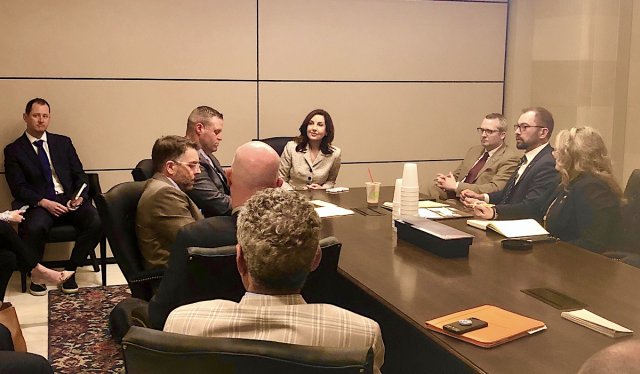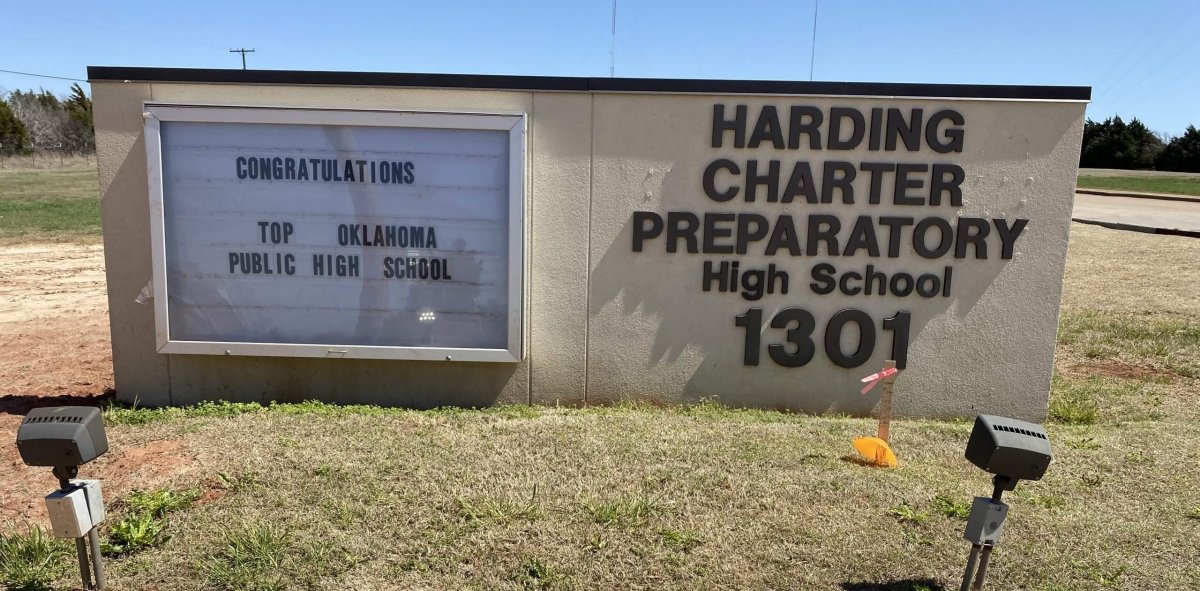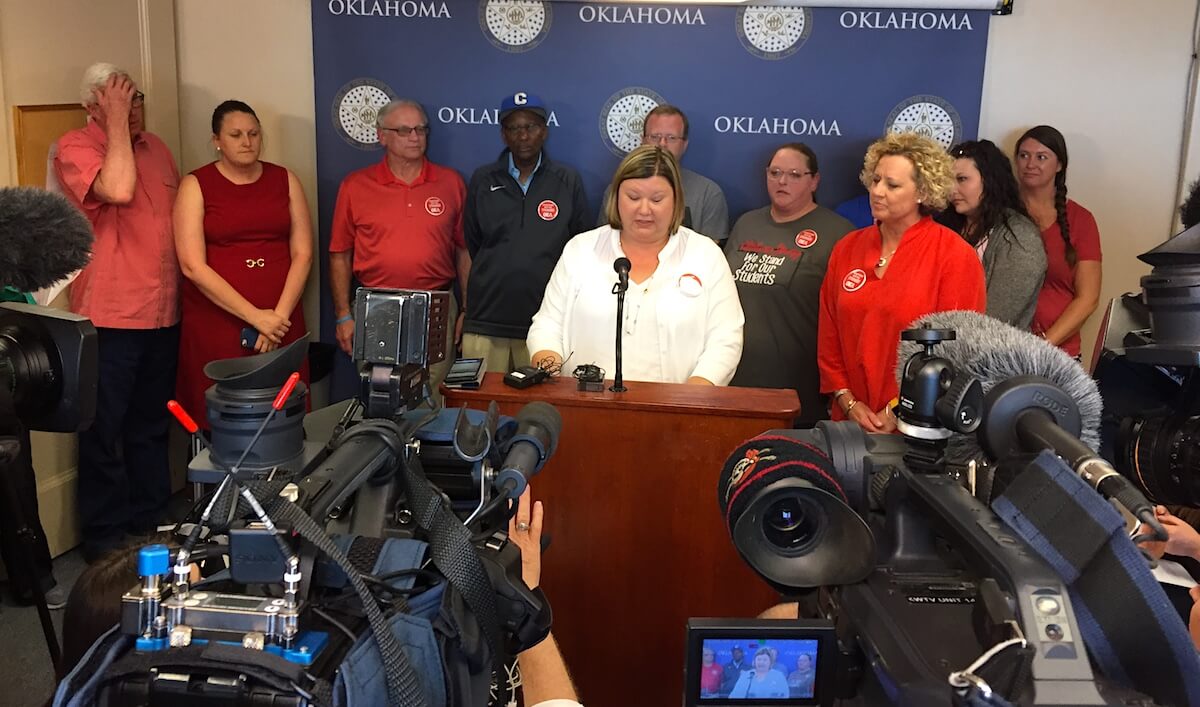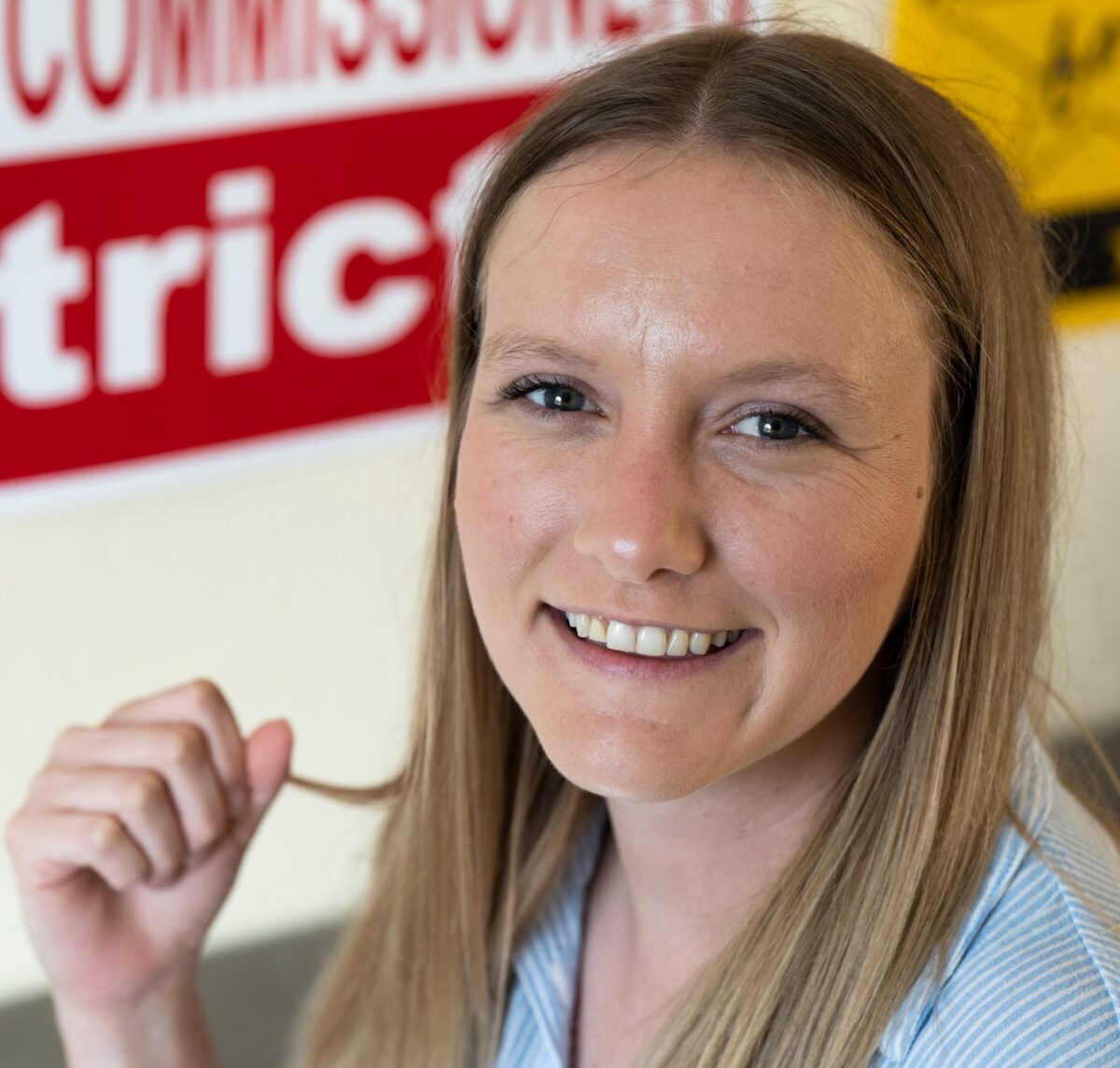
(Update: Two days after the publication of this article, Oklahoma City Public Schools and Tulsa Public Schools asked a court for a temporary restraining order and an injunction to stop implementation of the State Board of Education charter school funding resolution discussed below.)
Uncertainty surrounding the State Board of Education’s 4-3 vote last week on a resolution stating that public charter schools should receive the same funding as traditional public schools can be summed up by Oklahoma Superintendent of Public Instruction Joy Hofmeister’s answers to a series of questions Tuesday afternoon.
Asked if she had signed the board’s resolution — which she voted against and that would become the basis for the Oklahoma Public Charter School Association dismissing a 2017 lawsuit — Hofmeister said she had not. When asked if she plans on signing the document, she said she did not know. When asked what the results would be if she does or does not sign the settlement, she was also unsure.
“That is something that, since it just came in and I voted ‘No,’ we’ll fully examine,” Hofmeister said moments after meeting with more than a dozen House Republicans about the situation Tuesday.
The controversial decision has pushed conversation about how charter schools should be funded to the forefront of the Oklahoma political landscape. The fiscal impact of the board’s resolution also remains undetermined as stakeholders weigh potential legal action and the Oklahoma Legislature crafts next year’s state budget ahead of the policy taking effect July 1, unless it is challenged in court.
“It’s a damn mess,” said one Republican lawmaker familiar with discussions.
The confusing situation stems from a pending 2017 lawsuit filed by the OPCSA, which has argued that the board was not funding public charter schools in the state equitably. The OPCSA sought to recover funding from past years in its suit, which the State Board of Education’s vote was intended to settle.
Among other statements, the board’s lengthy resolution specified that:
“That charter schools shall be funded as a public-school district and in furtherance of the legislative intent to provide the greatest measure of equalization of funding between public schools” and “that as a site within the school district in which the charter school is located, a district sponsored charter school shall receive from its sponsoring local school district board of education its proportionate share of the general fund, the building fund and all other local revenue and all state dedicated revenue.”
In effect, the resolution will shift additional public funding from traditional school districts to charter schools, which can be sponsored by local districts, technology centers, higher education institutions, tribal nations or the State Board of Education.
Hofmeister and others have called the resolution illegal and unconstitutional, but the state’s governor argues otherwise.
“I commend the State Board of Education for its lawful decision to uphold current statute and affirm that charter schools are public schools,” Gov. Kevin Stitt said in a statement Monday. “This decision is the right one for Oklahoma students. (…) Public school students should not be punished for succeeding in a charter school setting. Further, existing statute makes clear that charter schools are eligible for local revenues.”
While the exact fiscal impact the resolution will have on both charter and traditional public school districts is difficult to estimate, Hofmeister said the amount could be in the tens of millions of dollars. House Democrats held a press conference Monday, citing the same estimate and saying that public school districts and associations are considering their legal options.
“I think there are multiple organizations looking at potentially intervening in this,” House Minority Leader Emily Virgin (D-Norman) said, noting that Oklahoma City Public Schools and Tulsa Public Schools had joined OSDE in defense of the original lawsuit. “They would have standing, I think, to appeal any sort of settlement in this case.”
When asked if this is an issue she’d like the state legislature to address, Hofmeister said she doesn’t believe there is a need.
“Why would the legislature need to do that? This is already clear. It’s in statute and in the constitution, so I don’t know that there is a need,” Hofmeister said. “However, I think there’s a separate conversation that we’re always open to when it comes to anything related to education policy.”
‘We must follow the law’ on charter school funding

Appointed by Gov. Kevin Stitt in January, Trent Smith is the state board’s newest member, and he requested that the state board consider settling the lawsuit by passing the resolution to move toward equalized funding for charters. In an interview after the vote, Smith said he believed the ongoing litigation with the OPCSA could have cost the State Department of Education millions.
“I asked that we discuss it, and I got it on the agenda, and we reviewed the settlement offer which essentially would eliminate that liability in exchange for funding charter schools, which are public schools, equitably the same as non-charter public schools are, which makes total sense,” Smith said. “Kids that attend charter schools are no less valuable than kids that attend non-charter public schools.”
Smith said he has heard estimates that the impact of the policy change could shift between $40 to $60 million a year to public charter schools, including virtual charter schools such as Epic. He called the resolution a win for students in charter schools and their families, as well as the SDE, although he suggested that the Legislature could take further action if they believe virtual charter schools should be treated differently than brick-and-mortar charter schools.
“A lot of charter schools outperform public schools by quite a large margin, and they have no ability to increase their facilities or size or to lease space, they can’t bond,” Smith said. “We [have been] essentially saying if you choose to put your kid in a charter school, they’re only worth three-fifths of what a regular public school student is.”
Critics of charter schools point out that many do not face the same requirements that traditional public schools do, and some argued that charters effectively skim many of a district’s highest performers off the top of the student population.
Read the full
State Board of Education resolution
Hofmeister disagreed with Smith’s assessment that the pending lawsuit with OPCSA would have cost the OSDE millions, and she said the fiscal impact of this resolution has yet to be determined. She said the OSDE and revenue providing entities, such as the Oklahoma Tax Commission, would have to develop a fiscal impact.
“We know we’re talking about potentially tens of millions of dollars because of the scale,” Hofmeister said. “There was a time in 2017 where a settlement had been proposed. It was never agreed upon, and it was nothing close to this. One of the big differences between this and what was proposed the night before the board meeting is the earlier proposed settlement between stakeholders and different intervening parties in that lawsuit was that it only involved the charter schools that were brick and mortar. This is involving statewide virtual [charter schools].”
Although Hofmeister said the funding amounts are undetermined, Smith said he was told the funding equalization could provide an estimated $500 to $800 a year per student in public charter schools. For virtual charter school districts like Epic Charter Schools, which reported a 2020-21 enrollment of about 60,000 students, the annual impact could be enormous.
“I made a decision [that day], and three of my fellow board members agreed with me, that regardless of what this means for virtual schools, brick and mortar charter schools have been underfunded and have been fighting with an arm and a leg tied behind their back for two decades or more, and it’s time for that to stop,” Smith said.
Oklahoma City Public Schools issued a statement Monday saying that while the settlement would certainly benefit the more than 80,000 Oklahoma students attending charter schools, it would come at the expense of more than 700,000 students attending traditional public schools.
The statement also referenced the Oklahoma Charter School Act, which OKCPS said “has never allowed charter schools, which do not have publicly elected boards, to levy taxes, issue bonds, or receive local property tax revenue for building funds.”
“I applaud Superintendent Hofmeister for her efforts to inform the full board of the inappropriateness of the action that was eventually taken,” OKCPS Superintendent Sean McDaniel said. “I am hopeful that the State Board of Education will immediately reconsider their reckless and harmful decision.”
The law referenced, however, only specifies that “the governing body of a charter school shall not levy taxes or issue bonds.” The act also notes that “the State Board of Education shall determine the policy and procedure for making payments to a charter school.”
During Thursday’s State Board meeting where the resolution was approved, Hofmeister encouraged board members to vote against the motion saying that she had received legal advice that the resolution would violate portions of Article 10, Sections 9 and 10 of the Oklahoma Constitution.
Asked Tuesday what constitutional language they were citing, Hofmeister and OSDE general counsel Brad Clark said their legal arguments are contained in their summary judgment motion filed in the original lawsuit. Later, Hofmeister’s chief of staff, Phil Bacharach, emailed additional statements primarily related to the statutory Oklahoma Charter School Act.
“Accessing the local revenue that plaintiff seeks expressly requires a levy of taxes; a vote of the people within a defined taxing unit,” he said. “Charter schools have neither an ability to levy taxes nor a defined taxable unit. It is erroneous to suggest that charter schools can do something indirectly that they cannot directly do (i.e., levy taxes). That approach, to penetrate a defined taxing unit’s building fund that was voted on by the taxpayers in that tax base, is misplaced, without support in law and against our foundation of taxation without representation. It would be arguably different if charter schools were school sites within a sponsoring school district, which has a tax base. But it is unfounded to have a charter school sponsored by a statewide virtual charter school board penetrating the Broken Arrow Public Schools building fund without any vote ever occurring by Broken Arrow taxpayers to divert the funds from that taxing unit.”
Bacharach said that action to direct how public schools are funded “is the province of the Legislature, and that has been the law from statehood.”
“The [Oklahoma Charter School Act] expressly forbids a charter school from issuing bonds. Understanding this explicit prohibition, the charter schools know that, to participate, a change in state law must occur,” he said. “This would explain their attempt this year to change state law. To see this, look no further than House Bill 2755, which would amend state law to add instances in which a charter school can participate in a school district’s bond proposal. If the charters understand the need to change law in this instance, logic suggests that same method and transparency be followed in the instance of participating in a tax levy.”
Hofmeister called the situation extraordinary as the lawsuit had been at an impasse for years. She said each year the Legislature has had an opportunity to address the issue, but lawmakers have not done so. Charter school advocates argue that traditional public school leaders have opposed their proposals.
“Students in charter schools are public school students and I am fighting for the strong support and resources for all public school students. We must follow the law. If there’s disagreement with the law, then the legislative process changes that or there would be some party prevailing in court. That had not happened in this case, and a settlement can’t violate state law or the state constitution,” Hofmeister said. “It was an inappropriate, truly outrageous action, and I think it was also one that will impede progress where there might have been an opportunity to actually settle for students in the traditional brick and mortar charter schools while excluding those that are statewide virtual.”
Follow @NonDocMedia on:
Education organizations respond

OPCSA President Chris Brewster released a statement in support of the State Board’s decision Thursday night.
“This settlement is a tremendous step towards funding equity for the students who attend our state’s public charter schools,” Brewster said. “We pursued this action based on the belief that our students deserve the same educational opportunities and funding as their peers who attend traditional public schools. It is fundamentally unfair for districts to receive funding for students who do not attend their schools. This settlement rights that wrong.”
Executive director of ChoiceMatters, a school choice organization, Robert Ruiz also released a statement praising the decision.
“We believe the best way to improve public education, boost educational outcomes, and better serve parents and students is by providing them with as many options as possible within the public school system,” Ruiz said. “Charter schools, which are free and open to all, are one of the primary vehicles for expanding educational choice. For too long, unequal funding has stifled their growth. Yesterday’s decision by the Oklahoma State Board of Education helps to close the funding gap between charters and traditional public schools and is a major victory for parents and students.”
However, other organizations are not as pleased with the motion being approved. In a statement provided to NonDoc, Oklahoma Education Association President Alicia Priest spoke against the state board’s decision.
“The state board does not have the legal authority to change a state statute, so we are looking at legislative and legal responses,” Priest said. “We believe the state board does not have the authority to change the way charter schools are funded. Making such a change was statutorily and constitutionally inappropriate. How schools are funded is the prerogative of the State Legislature.”






















